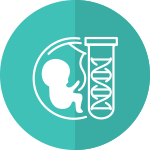Blastocyst culture is an embryo cultivation process that occurs in a laboratory of high quality and standard. This process involves the use of suitable nutrient-rich solutions, allowing the embryos to develop and proliferate into a greater number of cells, ranging from 60 to 200 cells. Generally, this stage of embryos occurs around 5 to 6 days after fertilization and egg retrieval.
However, not all embryos are strong enough to reach the blastocyst stage. In fact, only about 50% of embryos will perish to some extent in the period after day 3. Therefore, this serves as evidence that transferring embryos at a more robust stage, which is the blastocyst stage, yields a success rate of approximately 50%, compared to around 35% at earlier stages.
Advantages of Cultivating and Transferring BLASTOCYST Stage Embryos
- Closest Natural Replication
- Selection of the Best Embryos for Transferring
- Preliminary Embryo Screening
- Enabling the uterus to be in a condition ready for implantation
- Remaining viable embryos can be frozen and stored for future use.








